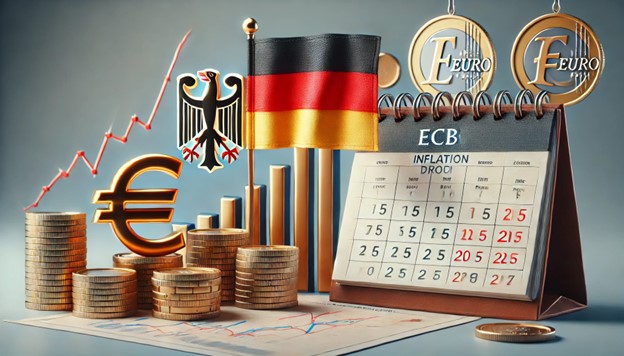Germany’s inflation rate continued to decline in September 2024, with the latest data showing it has fallen below the European Central Bank’s (ECB) 2% target. The decrease in inflation has heightened the likelihood of an interest-rate cut at the ECB’s upcoming October meeting, following a previous rate cut in September.
Inflation Falls to 1.6% in September
According to data released by the German statistics office, Destatis, consumer prices in Germany were 1.6% higher in September 2024 than the same time last year. This is a slight drop from the 1.9% inflation rate recorded in August 2024. Notably, this marks the lowest inflation figure since February 2021, indicating a significant cooling of price pressures in Europe’s largest economy.
The 1.6% figure was lower than the 1.7% forecasted by economists polled by The Wall Street Journal, suggesting inflation is easing faster than expected. This drop follows similar inflationary trends in other major European economies, such as France and Spain, where inflation cooled more rapidly than anticipated.
Impact of Lower Energy Prices and Services Inflation
A significant factor in the decline in inflation is lower energy prices. With energy costs historically being a significant driver of inflation in Europe, their recent reduction has contributed to the broader decrease in consumer price growth. Germany, which heavily relies on imported energy, has benefited from the global drop in energy prices.
However, it’s not just energy prices that have contributed to the easing inflation. Services inflation, closely monitored by ECB policymakers, also edged down slightly. In September, services inflation stood at 3.8%, down from 3.9% in August, reflecting a broader cooling of price increases across multiple sectors of the economy.

Rising Pressure on the ECB to Cut Rates
The ongoing decline in inflation is increasing pressure on the ECB to implement further monetary easing measures. The ECB, which had already cut its key deposit rate to 3.5% earlier in September, is now facing growing calls to lower rates again at its next meeting on October 17.
Analysts suggest that with inflation consistently falling below the ECB’s 2% target, there is more room for the central bank to introduce measures to stimulate economic activity, particularly as Europe grapples with slow growth.
The Fragile State of the German Economy
The potential for an additional rate cut also comes amid concerns about the German economy’s fragile state. In the second quarter of 2024, the German economy contracted slightly, reflecting a broader slowdown in economic activity. This economic weakness is largely attributed to a persistent slump in the manufacturing sector, which remains one of Germany’s most important industries.
German manufacturers have faced ongoing challenges, including supply chain disruptions, higher input costs, and weak global demand. The combination of lower inflation and a sluggish economy creates a more favorable environment for an ECB rate cut, as monetary easing could help support struggling industries and boost economic growth.
A Broader European Inflation Trend
Germany is not the only country experiencing a rapid decline in inflation. Similar trends have been seen across the Eurozone, particularly in France and Spain, where inflation also cooled faster than expected in September. This trend reflects a broader easing of inflationary pressures across the continent, further bolstering the case for a region-wide shift in ECB policy.
The rapid decline in inflation across multiple European economies suggests that the ECB’s previous interest rate hikes may have achieved their intended effect of slowing price growth. With inflation now falling below target, the focus is shifting toward fostering economic growth while maintaining price stability.
Looking Ahead: The October ECB Meeting
All eyes are now on the ECB’s upcoming meeting in October, where policymakers will decide on the next steps for monetary policy. While the central bank has been cautious about making rapid changes to its rate policy, the latest inflation data provides strong support for further cuts.
A consecutive interest rate reduction in October could provide much-needed relief for the struggling German economy and help spur broader economic activity across the Eurozone. As inflation continues to cool and energy prices remain low, the possibility of another rate cut remains high.
The ECB’s decisions in the coming months will be crucial in shaping the future of the Eurozone economy, with the goal of balancing price stability while supporting growth. The situation in Germany, as well as other major European economies, will undoubtedly play a significant role in determining the ECB’s next move.












